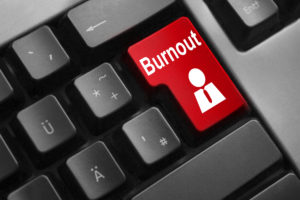Burnout is a big deal. Many employees experience physical and emotional exhaustion caused by the stress and strain that they feel at work. Of course, everyone is responsible for taking care of their own health. However, managers and HR professionals certainly play a role in creating a positive work environment for employees by supporting their well-being. After all, we spend a large portion of our time at work. We can eat well, exercise, and have a great support network outside of our jobs, but spending the majority of our week in an overwhelming, stressful environment is bound to negatively impact us.
So what is burnout? What causes it and how do we prevent it? According to the World Health Organisation, “burnout is a syndrome conceptualized as resulting from chronic workplace stress that has not been successfully managed.” But what does this mean in the real-life context of your workplace and employee experience?
Burnout Symptoms to Look Out For
The first place to look is your energy levels. Do you feel like you’re full of energy and prepared for the day ahead? Or, do you feel like you’re dragging yourself out of bed, with energy levels hitting the floor by lunchtime? No one can work at full throttle all week long and of course, we all have off-days. However, if you feel constantly tired and unmotivated, there might be a problem.
Another indicator to look out for is your emotional response. How do you feel about your work? Have you noticed a dip in your productivity levels? Perhaps your attitude towards your work has changed and where you would have welcomed a challenge previously, you are now feeling overwhelmed. You may feel stressed and incapable of managing your workload. Conversely, you may find that you have become indifferent towards the quality of your work where you would have taken pride in your work previously.
Burnout may also affect your quality of work. For instance, you may find yourself slipping up and making silly mistakes. When you’re feeling overwhelmed or stressed, you’re more likely to make mistakes. This is because you’re not focused 100% on the task at hand; you may be distracted or have trouble concentrating. You may also notice that it’s taking you longer to complete a project or your attention span is waning during meetings.
As well as these observations, it might be helpful to consider these reflective questions to assist in identifying the signs of burnout.
- Do you have a manageable workload?
- Are you being supported in the way you need to complete your tasks?
- Are there effective communication channels in place if you need to discuss an issue?
- When you speak, are you being heard?
- Do you see positive actions taken after speaking up?
- Are you leaving work on time, taking your breaks and holidays, as well as properly switching off when you do?
- Does your company culture promote wellbeing?
The last two go hand in hand. In theory, everyone might work nine to five and have 20 plus days holidays to take, but how many of them do you take? How often do you feel you need to stay late or answer emails when out of the office? Over time, this builds up and can impact your health so company culture can play a big role here.
Avoiding Burnout At Work
You have the power to prevent burnout and have a more positive experience in your workplace. To get started, here are our top tips to avoid work burnout.
1. Prioritise Wellbeing
It’s crucial that wellbeing is more than just a buzzword in your workplace. To make sure it becomes part of your daily experience, you will need to prioritise your wellbeing. This means taking regular breaks and stepping away from the desk. If you’re working from home, try to separate your workstation from the rest of your home by setting up your desk in the spare room. If you’re tight on space, try to pack up your work laptop and store it where you cannot see it. This will help you “switch off” from work when you’re out of office hours – out of sight is truly out of mind in this case.
During your workday, try to take regular breaks. Make sure you stand up and stretch at regular intervals throughout the day. Perhaps you can stretch your legs by taking a quick walk around the office or popping to the kitchen for a fresh cup of tea! If you’re finding your energy levels dropping off as the day progresses, try to opt for high protein foods at lunchtime. Protein helps boost your energy levels and will help you beat that 3 pm slump.
If you feel overwhelmed throughout the day, you could try some breathing exercises to help calm and focus your mind. You can do easily do these at your desk and they can be quite effective! You should aim to check in with colleagues throughout the day too – particularly if you’re working from home. Working remotely can feel a little isolating at times and can contribute to work burnout. We suggest you schedule a couple of minutes per week with your colleagues to catch up and chat about things other than work.
2. Seek Support
A problem shared truly is a problem halved and if you’re experiencing work burnout, we suggest reaching out to your manager or HR professional. For instance, if your stress stems from an unmanageable workload, speaking to your manager can help. They can work with you and your colleagues to delegate the workload differently, taking some of the pressure off of you. Alternatively, they may be able to work with you to find new ways of prioritising or managing your time so that you can manage your workload better.
It might be the case that you are going through some personal difficulties that are making it tough to focus on your work life. Ongoing worries can be difficult to leave at home, and they can impact your mental and physical health over time. This, in turn, can contribute to burnout at work. If this is the case, we suggest seeking support from a medical professional. Speaking with a doctor can help you care for your physical health and they can provide referrals for mental health care if needed.
As mentioned above, working from home can become quite lonely, especially if you are struggling with work burnout. Sharing frustrations and worries with colleagues is a good way to alleviate some of this stress. It’s quite likely that some of your coworkers will have experienced burnout symptoms at some point too, so they may be able to share ways in which they dealt with it. Check in with your coworkers regularly throughout your workday to quell feelings of loneliness and form friendships within the workplace.
Every company and culture is different. However, employees need to have a voice in their workplace, a safe space to use it and be heard when they do. Therefore, it is vital to have communication systems in place that people use, where they are actively listened to. People should feel comfortable sharing whether they are okay or not. If you do not have this space in your workplace, it would be worth setting up regular check-in meetings with colleagues and HR.

3. Be Kind to Yourself
The time we are living in isn’t helping matters either. It’s crucial to acknowledge the impact of the ongoing pandemic on all of us. People have to be more alert than usual, in ways we’ve never had to before, and for an extended period with no set end date. Keeping all sides going and adapting to huge changes in the way we live is stressful and a nesting ground for burnout, especially when it comes to the workplace. It makes sense if people are exhausted, even if they aren’t sure why.
The very nature of the pandemic is a prolonged stressful situation, so it’s vital now, more than ever, to watch out for the signs of burnout and to catch it before it takes hold. There might be lots we cannot control at the moment, but you can take action now to prevent burnout in the future. But with all of this said, the same applies to you. Burnout doesn’t discriminate and looking after yourself needs to be a priority.
Are You Suffering From Burnout?
Try out our quiz below and see how you are doing. Take your time to read the following statements, then simply answer Yes or No to each of them.
- Do you feel physically tired after work?
- Do you lack the motivation to do your job?
- Have you noticed yourself making more errors than usual?
- Do you feel emotionally exhausted after work?
- Are you finding it hard to relax after your working day?
- Are you having difficulty sleeping due to work worries?
- Do you feel like you don’t have enough time to complete your work tasks?
- Do you have negative feelings about your job?
- Are you struggling to achieve your work goals?
- Do you often feel misunderstood by your work colleagues?
- Do you feel office politics get in the way of you doing your job?
- Are you getting frustrated easily with others at work?

Low Risk of Burnout – (Yes to 0-4 Statements)
It looks like you are doing well when it comes to your well-being. Keep up the great work, as it’s not easy to balance all the stresses work and life offer. Continue doing what you are doing and check back in from time to time to monitor how you are. Be sure to ask for help if you ever need it.
Medium Risk of Burnout – (Yes to 5-8 Statements)
The good news is you have time to take action before your situation risks going in the wrong direction. It’s important to read the signs of this pre-burnout stage and act now. Speak to your doctor or HR at work to see what might lighten the load. Where you can, try to eat well, limit alcohol, get restful sleep, and take some time off work to rejuvenate.
High Risk of Burnout – (Yes to 9-12 Statements)
We’d recommend you speak with your doctor as soon as you can. The more you try and push through, the worse this will get. When things get to this stage, taking a break may not even seem like an option. But it has to happen for you to avoid burnout, which will also require time to recover from. So take the steps now, speak with your doctor, HR manager or relevant professional to support you in taking a break, and getting the rest and help you need.
This tool is intended as informational only, and the results of this quiz are not a medical diagnosis. There can be many reasons why someone might feel stressed, tired, anxious, overwhelmed, or apathetic. If you are experiencing stress, you must take it seriously as it risks negatively impacting your physical and mental health. We suggest you always consult your doctor if you feel stressed, unwell, or concerned about your health and well-being.
What Are The Next Steps?
If you feel like you’re struggling with your mental or physical health, you can easily access one of our Irish-registered doctors through our online platform. Simply answer some brief questions about yourself and book an online video consultation with a doctor. Video consultations cost just €35, and our doctors are available 7 days a week, including evenings and weekends.








